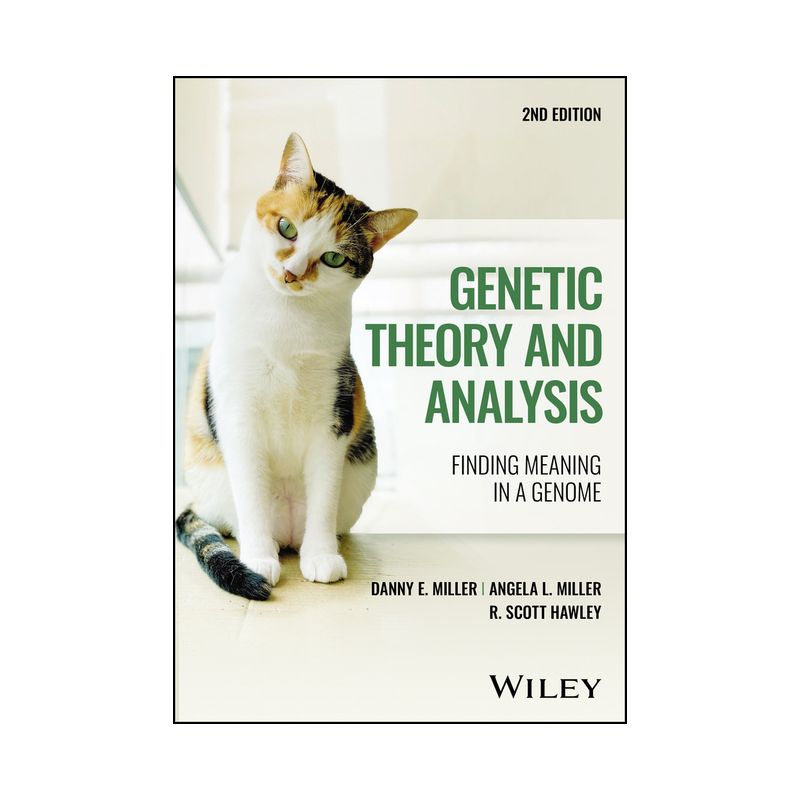Sponsored
Genetic Theory and Analysis - 2nd Edition by Danny E Miller & Angela L Miller & R Scott Hawley (Paperback)
Sponsored
About this item
Highlights
- GENETIC THEORY AND ANALYSIS Understand and apply what drives change of characteristic genetic traits and heredity Genetics is the study of how traits are passed from parents to their offspring and how the variation in those traits affects the development and health of the organism.
- About the Author: Danny E. Miller, MD, PhD is an Assistant Professor in the Department of Pediatrics, Division of Genetic Medicine and Laboratory Medicine & Pathology at the University of Washington in Seattle, WA, USA.
- 304 Pages
- Science, Life Sciences
Description
About the Book
"Since the first edition of this book was published, there have been many advances in genetics and genomics that are captured in this edition--to a point. Many genetics textbooks are geared either toward introductory undergraduate and/or medical students, providing primary information and touching on well-known historical milestones in biology. The spirit of this book has always been to consolidate and discuss key genetic studies from the literature then link those to current ideas in genetics. The goal is to provide a solid foundation to understand how genetic analysis was done in the past and link it to how it is being used today. For example, in the past, an investigator may have done a technically challenging screen to identify genes of interest in a biological pathway, while today, new sequencing technology could be used to identify mutations more easily in genes in that same pathway. Real-world clinical examples highlight the importance and relevance of the topics discussed to human disease. Finally, this edition will also include a glossary to make the content more accessible to undergraduates"--Book Synopsis
GENETIC THEORY AND ANALYSISUnderstand and apply what drives change of characteristic genetic traits and heredity
Genetics is the study of how traits are passed from parents to their offspring and how the variation in those traits affects the development and health of the organism. Investigating how these traits affect the organism involves a diverse set of approaches and tools, including genetic screens, DNA and RNA sequencing, mapping, and methods to understand the structure and function of proteins. Thus, there is a need for a textbook that provides a broad overview of these methods.
Genetic Theory and Analysis meets this need by describing key approaches and methods in genetic analysis through a historical lens. Focusing on the five basic principles underlying the field--mutation, complementation, recombination, segregation, and regulation--it identifies the full suite of tests and methodologies available to the geneticist in an age of flourishing genetic and genomic research. This second edition of the text has been updated to reflect recent advances and increase accessibility to advanced undergraduate students.
Genetic Theory and Analysis, 2nd edition readers will also find:
- Detailed treatment of subjects including mutagenesis, meiosis, complementation, suppression, and more
- Updated discussion of epistasis, mosaic analysis, RNAi, genome sequencing, and more
- Appendices discussing model organisms, genetic fine-structure analysis, and tetrad analysis
Genetic Theory and Analysis is ideal for both graduate students and advanced undergraduates undertaking courses in genetics, genetic engineering, and computational biology.
From the Back Cover
Understand and apply what drives change of characteristic genetic traits and heredity
Genetics is the study of how traits are passed from parents to their offspring and how the variation in those traits affects the development and health of the organism. Investigating how these traits affect the organism involves a diverse set of approaches and tools, including genetic screens, DNA and RNA sequencing, mapping, and methods to understand the structure and function of proteins. Thus, there is a need for a textbook that provides a broad overview of these methods.
Genetic Theory and Analysis meets this need by describing key approaches and methods in genetic analysis through a historical lens. Focusing on the five basic principles underlying the field--mutation, complementation, recombination, segregation, and regulation--it identifies the full suite of tests and methodologies available to the geneticist in an age of flourishing genetic and genomic research. This second edition of the text has been updated to reflect recent advances and increase accessibility to advanced undergraduate students.
Genetic Theory and Analysis, 2nd edition readers will also find:
- Detailed treatment of subjects including mutagenesis, meiosis, complementation, suppression, and more
- Updated discussion of epistasis, mosaic analysis, RNAi, genome sequencing, and more
- Appendices discussing model organisms, genetic fine-structure analysis, and tetrad analysis
Genetic Theory and Analysis is ideal for both graduate students and advanced undergraduates undertaking courses in genetics, genetic engineering, and computational biology.
About the Author
Danny E. Miller, MD, PhD is an Assistant Professor in the Department of Pediatrics, Division of Genetic Medicine and Laboratory Medicine & Pathology at the University of Washington in Seattle, WA, USA. He is the recipient of the 2017 Larry Sandler Memorial Award, the 2018 Lawrence E. Lamb Prize for Medical Research, and a 2022 National Institutes of Health Director's Early Independence Award. Dr Miller is a leader in the field of long-read sequencing technology and the use of new technology to evaluate individuals with unsolved genetic disorders.
Angela L. Miller is a Research Coordinator at the University of Washington in Seattle, WA, USA, with a background in journalism, visual communications, and molecular biology. She has published several peer-reviewed papers and has won multiple national awards for her work as a journal art director.
R. Scott Hawley, PhD is an Investigator at the Stowers Institute for Medical Research, Kansas City, MO, USA. He is a member of the National Academy of Sciences and former President of the Genetics Society of America, with faculty positions at the University of Kansas Medical Center and the University of Missouri-Kansas City. During his distinguished career, Dr. Hawley has mentored hundreds of trainees, received numerous genetics awards, written six textbooks, and published extensively on meiosis.
Additional product information and recommendations
Sponsored
